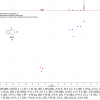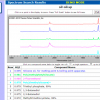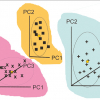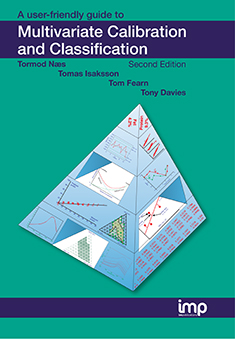Antony N. Daviesa and Peter McIntyreb
aSERC, Sustainable Environment Research Centre, Faculty of Computing, Engineering and Science, University of South Wales, UK
bLaugharne, Carmarthenshire, Wales, UK
The last 18 months has been a really sad time with the passing of several of the founding fathers of British spectroscopy. Peter McIntyre and I thought it would be good to celebrate briefly the life of a real Welsh character and educator whose style and charisma influenced many to go on and not only stay in science but to rise to leading positions either in industry or academia.
Award winning Fellow—in more ways than one
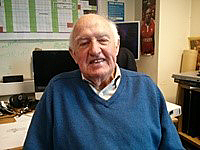 Professor William (Bill) George BSc (Hons), PhD, DSc, CChem. FRSC, FLSW was educated in South Wales. He attended the same grammar school as Sir Harry Secombe, but I have no indication that this early training was the root of Bill’s humour. I don’t think Bill’s time at Dynevor Grammar School overlapped with Harry Secombe, but Bill went on to Swansea Technical College and University College, Swansea before spending periods in industry at the United Kingdom Chemicals Company, Swansea and moving out of Wales at the Distillers Company Research Laboratory in Epsom.
Professor William (Bill) George BSc (Hons), PhD, DSc, CChem. FRSC, FLSW was educated in South Wales. He attended the same grammar school as Sir Harry Secombe, but I have no indication that this early training was the root of Bill’s humour. I don’t think Bill’s time at Dynevor Grammar School overlapped with Harry Secombe, but Bill went on to Swansea Technical College and University College, Swansea before spending periods in industry at the United Kingdom Chemicals Company, Swansea and moving out of Wales at the Distillers Company Research Laboratory in Epsom.
Bill moved into academia, spending 13 years at what is now Kingston University in London where he became its first Reader and led the first MSc Course.
It is, however, his time spent having returned as an educator and researcher to Wales where most of the anecdotes from his life arise. Bill saw huge change during his career, his laboratories in Pontypridd were located in the original buildings of the revolutionary South Wales and Monmouthshire School of Mines, in Treforest. By 1958 the School had expanded its courses in science, technology and commerce and been renamed Glamorgan College of Technology. As the expansion continued it evolved into Glamorgan Polytechnic and then the Polytechnic of Wales in 1975 when Bill was appointed Head of the Department of Science.
He progressed up the career ladder in the years prior to the Polytechnic of Wales achieving university status. He became first Dean of the faculty of Science in 1984, adding Assistant Director for Research & Consultancy to his roles in 1988. The Polytechnic of Wales became the University of Glamorgan in 1992 and a year later found Bill taking on the increased burden of Pro Vice Chancellor. He was appointed Professor of Molecular Spectroscopy in 1997 and Emeritus Professor in 2000, although this later status change famously did little to hinder his research activities and, as he continued to obtain research grants—often for supercomputing time for ab initio and DFT studies—and to publish his results with his colleagues and former students! On April 2012 he was honoured to be elected as a Fellow of the Learned Society of Wales.
- 1959/60: awarded a University of Wales Fellowship
- 1974: awarded a DSc by the University of Wales
- 1975: appointed Head of the Department of Science at the then Polytechnic of Wales
- 1984: also became Dean of Faculty
- 1988: Dean of Faculty and Assistant Director for Research and Consultancy
- 1993: Pro Vice-Chancellor for three years
- 1997: Professor of Molecular Spectroscopy
- 2000: Emeritus Professor
- 2008: Awarded Hon. DSc by University of Glamorgan
- April 2012: Elected Fellow of the Learned Society of Wales
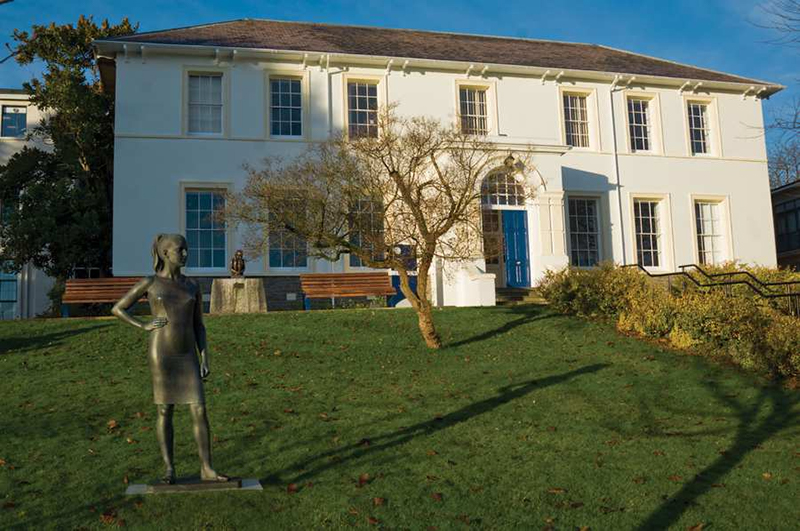
Figure 1. The original School of Mines Building.
His interest in improving teaching in molecular spectroscopy and, later, computational methods brought him to my attention when he and Peter McIntyre published the first interesting chapter on the use of the JCAMP-DX data standard shortly after it had become available across most infrared spectrometer software packages! Really early adopters! His series of textbooks published with different co-authors through John Wiley & Sons became the standard teaching texts in their field.1–5
He did not restrict his educational teaching to University level students, but also toured his fascination with spectroscopy around schools and other centres under the title of “What can the rainbow tell us?”
He even published a poem in an edition of this magazine in 2011 sticking to the rainbow theme entitled “The Rainbow Road from Genesis to Nemesis”!5
Working for the spectroscopy community
Bill worked hard for the community of spectroscopists as a stalwart of the Infrared and Raman Discussion Group and the Association of British Spectroscopists Trust. Long-term ABS Trust treasurer, Terry Threlfall remembers Bill being genial, unperturbable and always full of good humour. Geoff Dent reminded me that Bill put on training courses which became IRDG courses and he was (using his love of computing!) the designer of the first ever IRDG website.
He served on Committees of the Science and Engineering Research Council (SERC), Council for National Academic Awards (CNAA) and the Royal Society of Chemistry (RSC). Locally he chaired the RSC Local Section Committees for both S. East Wales and S. West Wales Sections.
His industry background helped his work as Chair of the Academic Industry Links Organisation and Chair of the Deans of Science Committee, contributing to the widening of the role and membership of both organisations following the expansion in the number of UK universities in 1992. For all his activities promoting spectroscopy, he was awarded the prestigious Norman Sheppard Award in 2017 (Figure 2).
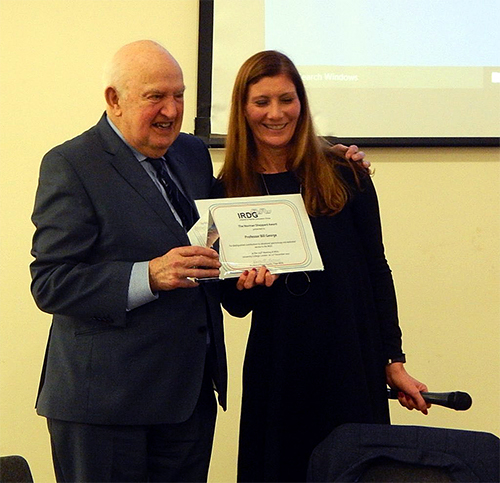
Figure 2. Bill George receiving the prestigious Norman Sheppard Award from Professor Karen Faulds in 2017.
The IRDG Norman Sheppard Award Committee:
It is with a strong sense of personal pride and honor that l nominate Professor WC “Bill” George for the prestigious lRDG Norman Sheppard Award.
As can be seen from his resume, Bill has had a long and prestigious academic track record, authoring or co-authoring more than 100 peer-reviewed publications focused almost exclusively on infrared and Raman spectroscopy. Later in his career Bill’s work began to focus on the demographics, political landscape and the state of funding of scientific research in the UK; a cause that he still feels very strongly about.
Bill has been a long-standing supporter of education, and in particular higher education in Wales. He was one of the early driving forces that made the lRDG what it is today, and his enthusiasm for his work, and his passion for educating the next generation of scientists is exemplified by the excellent work he did organizing, developing and teaching a series of lRDG short-courses over a period of more than 20 years.
Bill was also an active volunteer in local high schools teaching ‘basic spectroscopy’ using the rainbow and other natural phenomena as a means of describing and explaining the interaction of light with matter. Bill was also quick to recognize the potential of the internet and web-sites for education, historical archiving and promotion. He played an active role promoting these developments at the University of Glamorgan, and in fact developed the first lRDG web-site.
Today the University of South Wales is the home to approximately 30,000 students going through a series of significant growth spurts since its early, and more humble, days as the South Wales and Monmouthshire School of Mines founded in 1913. Much of that growth occurred during Bill’s tenure as first the Dean of the Faculty of Science and then Pro Vice Chancellor. Bill’s position and commitment to higher education gave him a forceful and influential voice, he always spoke his mind and was active in promoting those values that he believed to be in the best interest of the students, and the university at large. Bill’s philosophy to education also extends beyond the formal teaching years at school or university. As one of Bill’s PhD students I can attest to the personal and professional support he gave to all his students both during and after their graduation. lndeed, his active support and interest in my professional development lasts to this very day more than 30 years after my graduation. I had the pleasure of meeting up with Bill again a couple of weeks ago and nothing changes, at the age of 84 he just wanted to talk about science and my career. He actively rummaged through his archives and supplied me with a series of reprints for me to take away with me to read!
I believe Bill is without doubt deserving of consideration for this award and I hope you will give my nomination your most serious consideration.
Yours, sincerely,
E. Neil Lewis
But most of all, Bill will be remembered as a unique character
During a visit to me at the Institute of Spectrochemistry and Applied Spectroscopy I was very keen to show off all the excellent work being carried out by our Molecular Spectroscopy group and the other teams in Dortmund. Bill showed polite interest in all I was so proud to show him… and then spent the next hour explaining the wonders of Microsoft Excel as a super tool to keep track of student grades!. This wasn’t exactly what I had expected and, as was Bill’s way, brought me right back down to ground. Pride does come before a fall.
There is also a story I haven’t really been able to verify around a visit to Norway where Bill was travelling in company and they had to stop at a service station where Bill left the car to stretch his legs. On returning to the car he got in and seemed completely unperturbed that he was now sitting next to a complete stranger. She was somewhat more surprised, especially when he continued the conversation. Bill took it completely in his stride when his travelling companions came to get him and escort him back to the car he had really been travelling in upon arrival!
The strength of the grounding in spectroscopy that Bill gave his students can be seen by the careers that they achieved after completing their PhDs. Prof. Alan Guwy, who heads up the Sustainable Environment Research Centre here in South Wales, can remember his first memorable experience on arriving at university as a fresh-faced undergraduate, knowing nobody, but heading down to the famous Otley public house next to the Treforest Campus where he got into conversation with a local character called Bill… it was only later in the week he discovered he had spent a pleasant evening over a few pints putting the world to rights with the head of the faculty he was just joining!
A shining example is Neil Lewis who completed his PhD with Bill before going on to work in the USA at the National Institute of Health. Neil founded and was president of Spectral Dimensions Inc. before becoming Chief Technical Officer and Technical Director of Malvern Instruments when they acquired Spectral Dimensions. Finally, he became the CTO and Head of R&D at Mettler Toledo Autochem. Neil wrote the excellent nomination for Bill for his Norman Sheppard award (see text box below). Neil became very good friends with Bill and explains in his own words some odd goings on at the famous Pittsburgh conference in New Orleans…
“Many years ago, there was a Pittsburgh Conference (Pittcon) in New Orleans. This was during the days when the attendance was enormous, and hotel space was always at a premium. At the time I was a post-doc at the NIH in the USA and Bill in his usual fashion had not planned ahead and was unable to secure a hotel room.
He called and asked if he could share with me. I informed him that I was already sharing with two other ‘twenty-something’ post-doc colleagues of mine and, even though he was welcome, it would be very ‘cramped’. He accepted and in the evening he was supposed to arrive, I told the hotel clerk that I was expecting him and asked them to provide him with an additional key.
My colleagues and I, being young, thirsty and in New Orleans, went out for an evening on the town! Well it must have been somewhere between 3am and 4am when we returned and burst into the room. Lights came on, Bill gave out several expletives, and sat bolt upright in his pyjamas buttoned to the top and on the edge of a tiny fold-out bed in the corner. It was a sight I will never forget! We were still in a raucous party mood and offered Bill a beer. Bill being the tremendous, good sport that he was he joined us. I remember him complaining that there was not a clean glass to be found for his beer and uttering a string of other sarcastic remarks that always came naturally to him.
After we had all managed to down a couple more beers, and to take a short nap, it was time to get up. I was personally awakened by loud and somewhat angry words coming from one of my colleagues complaining that the bathroom was locked!! As you can imagine, he was very keen to do what most people want to do first thing in the morning after a night consuming uncounted beers. Bill had locked the door and was taking a long hot bath making the next 30 minutes or so extremely tense! Eventually we all managed to get going for the day and I said to Bill that I would see him later. I never did, and I didn’t catch another single glimpse of him for the rest of the week... I presume he decided that he would be better off looking for other sleeping arrangements even if it meant just laying down in the hotel lobby.”
Bill’s memorable exploits continued right up to the final seminar in his honour when, having finished the presentations, he turned down the optics of the overhead projector into the base without turning the very strong light source off. He continued answering questions from the audience completely impervious to the smoke rising from the projector he was doing a good job of setting on fire. Bill was always a great promoter of the power of light! I think we will all miss him.
References
- W.O. George and P. McIntyre, Infrared Spectroscopy (Analytical Chemistry by Open Learning). Wiley (1987). ISBN: 978-0471913832
- W.O. George and H. Willis (Eds), Computer Methods in UV, Visible and IR Spectroscopy. Wiley (1990). ISBN: 978-0851863238
- W.O. George and D. Steele (Eds), Computing Applications in Molecular Spectroscopy. Wiley (1995). ISBN: 978-3540787648
- B.H. Stuart, W.O. George and P. McIntyre, Modern Infrared Spectroscopy (Analytical Chemistry by Open Learning). Wiley (1995). ISBN: 978-0471959175
- W.O. George, “Poem: The Rainbow Road from Genesis to Nemesis”, Spectrosc. Europe 23(3), 27 (2011). https://www.spectroscopyeurope.com/article/poem-rainbow-road-genesis-nemesis







